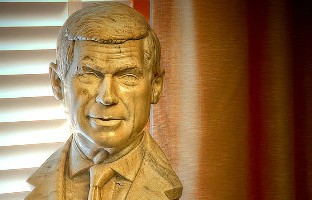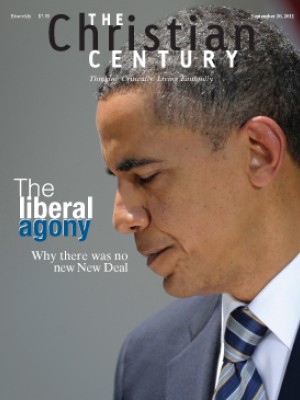The peaceable senator: Mark O. Hatfield, 1922–2011

In the midst of today's rancorous politics and the
trivialization of religion in the public square, the death of Mark O. Hatfield
on August 7 called to mind a different kind of political style and a different
kind of Christian political witness.
When Hatfield entered the U.S. Senate as a Republican from
Oregon in 1967, the Vietnam War hung over the nation like a dark cloud. He had
already registered his opposition to the war by casting the lone vote against
Lyndon Johnson's policies at the national governors' conference. He joined
Democratic Senator George McGovern in 1970 to introduce legislation to cut off
funds for the war. Following President Nixon's invasion of Cambodia that year,
that legislation became the political focus of the antiwar movement.
Read our latest issue or browse back issues.
Hatfield's evangelical Christian convictions and his
opposition to the war made him an unusual and controversial figure. At one
point, he was prohibited by the president of evangelical Wheaton College from
speaking at the school's chapel service. He made an indelible impression on an
emerging generation of young evangelicals who were searching for models of
faithful political action. Hatfield gave a powerful witness not only in opposing
the Vietnam War but in addressing issues of social justice and the global
division between rich and poor. When he read the first issue of the Post-American, the precursor to Sojourners, he immediately sought out
the editor, Jim Wallis. In 1973 he supported the Chicago Declaration of Social
Concern, a watershed statement by 40 evangelical leaders declaring their
Christian commitment to work for social justice.
A few years ago, I was in Kenya for a gathering of the
Global Christian Forum. When we gathered in small groups to share our journeys
of faith, I spoke of my work with Senator Hatfield. The face of a Kenyan
university professor and Christian leader suddenly lit up. "Mark Hatfield! I
have read his books and followed his story. He's the one who inspired me in my
Christian life and political work!" That story could be repeated thousands
times by students, pastors, activists, professors and politicians.
Hatfield was described by some at his memorial service as a
pacifist—a rather amazing label for a man who was a U.S. senator for 30 years.
It's a description he didn't publicly claim for himself, but he did find the
case for nonviolence in following Jesus compelling. I recall how he probed
those ideas with John Howard Yoder, author of The Politics of Jesus, during a lunch in the Senate Dining Room.
Warning constantly of the dangers of uncontrolled military
spending, Hatfield led a group of senators in challenging new weapons systems
proposed by the Pentagon in the 1970s. In 1982 he joined with Ted Kennedy in
proposing a nuclear arms freeze. Incredibly, he never voted in favor of a
military authorization bill, consistently protesting the escalating
expenditures for national defense—a voice all but lost in today's political
debate. His personal conversations with Billy Graham were a factor in
persuading the famous evangelist to take a public stand against the nuclear
arms race.
Defying predictable categories, Hatfield was also a strong
supporter of legislation to prohibit abortion. I remember Hatfield discussing
with Harold Hughes, the antiwar Democrat from Iowa, how Christian witness
should mean opposing all forms of violence against life. It's ironic that
perhaps the most prominent politician in recent decades to support the
"consistent ethic of life" advocated by Catholic social teaching was himself a
Baptist.
Committed to principles and his core convictions, he also
understood the tradeoffs necessary to get things done. When looking for votes
to cut off funds for the Vietnam War, he turned to Henry "Scoop" Jackson, a
prominent hawk and influential Democrat. At the time, Jackson was seeking
federal funding for the supersonic transport aircraft, which he thought could
revive the sagging fortunes of the Boeing Company, based in his home state of
Washington. Environmentalists and others were strongly opposed to the SST, but
Hatfield (and McGovern) privately offered to support the program if Jackson
would endorse the antiwar legislation. Jackson wouldn't agree. The
McGovern-Hatfield measure fell a few votes short.
What other senators and colleagues remember most about
Hatfield was his compassion and constant willingness to seek bipartisan
approaches that served the common good. Bill Clinton once said, "Mark Hatfield
loves his enemies, and so he has no enemies." In contrast to the adversarial,
partisan attack mode that has become ingrained in political behavior, Hatfield
always wanted to extend a hand rather than shake a fist. Without similar
examples today, our politics will continue to degenerate into pugnacious rituals
that paralyze possibilities to serve the common good.
Hatfield's civility was nurtured by faithful participation
in a weekly Senate prayer breakfast group. He believed that personal
relationships should transcend partisan and political divides, and he saw those
relationships as a key dimension of his own Christian discipleship. The circles
of that fellowship proved to be a key source of support in Hatfield's own times
of political and personal crisis.
Yet Hatfield was wary of attempts to use religion to give a
patina of righteousness to political power. Speaking at the National Prayer
Breakfast in 1973, with President Nixon on one side and Billy Graham on the
other, he said, "If we as leaders appeal to the god of civil religion, our
faith is in a small and exclusive deity, a loyal spiritual Adviser to power and
prestige, a Defender of only the American nation, the object of a folk religion
devoid of moral content." Speaking against the backdrop of Vietnam, Hatfield
said that "we must turn in repentance from the sin that scarred our national
soul." Few of his speeches received such widespread attention as this one did.
His prophetic words touched many people—and solidified his position on
President Nixon's "enemies list."
When the religious right emerged, Hatfield called it an
"embarrassment." His sharply contrasting approach can be glimpsed in this
passage in Between a Rock and a Hard
Place: "Radical allegiance to Jesus Christ transforms one's entire
perspective on political reality. Priorities become totally changed; a whole
new understanding of what is truly important bursts forth. There is an
uncompromised identification with the needs of the poor and oppressed. One is
placed in fundamental opposition to structures of injustice and forms of
national idolatry. Further, there is a commitment to the power of love as the
only means to the end."
Hatfield worked hard to live up to those ideals. His way of
joining faith and politics remains a powerful example, one needed these days
more than ever.
Granberg-Michaelson served on Mark Hatfield’s staff from 1968 to 1976.





